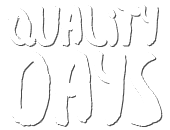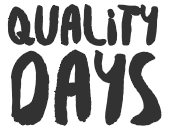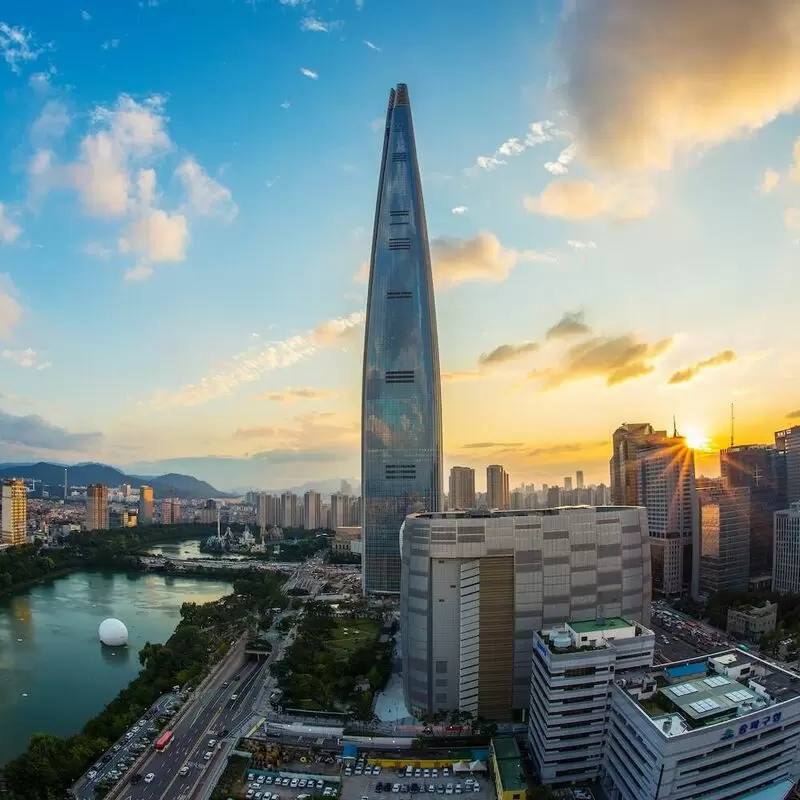
1. Gyeongbokgung Palace
Gyeongbokgung Palace is a must-see attraction in Seoul, South Korea. This grandiose spectacle of Korean architecture is the largest and most impressive of the city's five palaces, once housing the royal family and now open to the public. Visitors can experience the country's ancient history and rich culture firsthand through a variety of tours and exhibitions, including traditional performances. Insider tip: Don't miss the fascinating Changing of the Guard ceremony, which takes place several times a day. Nearby is the National Folk Museum of Korea, a wonderful place to learn about Korea's past.
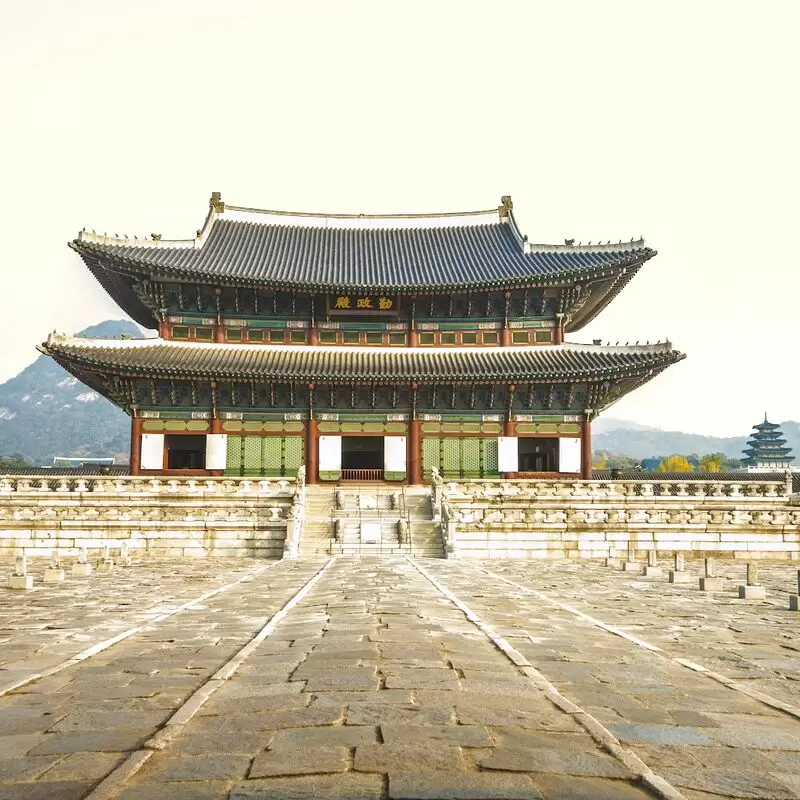 Gyeongbokgung Palace
Gyeongbokgung Palace
161 Sajik-ro, Jongno-gu
Monday - Sunday: 9:00 AM – 6:00 PM
Tuesday: Closed

161 Sajik-ro, Jongno-gu
Tuesday: Closed
2. N Seoul Tower
A visit to the N Seoul Tower is a must for any visitor to Seoul! This iconic tower is located at the top of Namsan Mountain and offers a breathtaking panoramic view of the city below. Whether you visit it during the day or at night, the view is absolutely breathtaking. But that's not all - there are plenty of exciting things to do at N Seoul Tower, such as visiting the Teddy Bear Museum, touring the Digital Art Gallery, and even putting a love lock on the fence. Insider tip: Take the cable car up, it's a once in a lifetime experience! While you're in the area, don't miss the beautiful Namsan Park, perfect for a leisurely stroll.
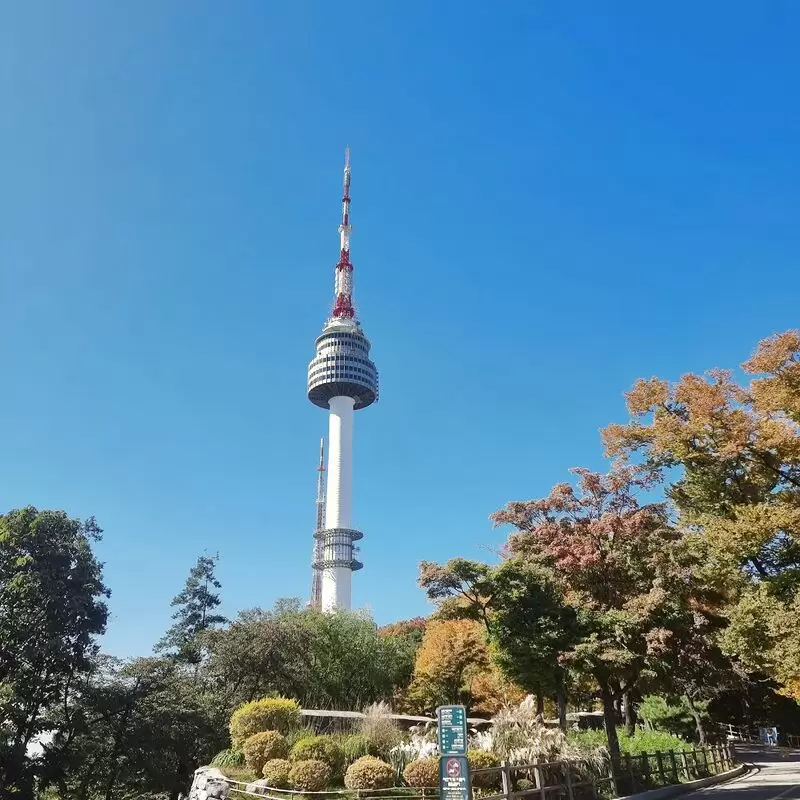 N Seoul Tower
N Seoul Tower
105 Namsangongwon-gil, Yongsan-gu
Monday - Sunday: 10:00 AM – 11:00 PM
Saturday: 10:00 AM – 12:00 AM

105 Namsangongwon-gil, Yongsan-gu
Saturday: 10:00 AM – 12:00 AM
3. National Museum of Korea
Are you ready for a breathtaking trip through Korea? The National Museum of Korea in the heart of Seoul is a must-see for history and art lovers. With over 220,000 artifacts, you can trace the country's history from ancient times to the present. Highlights include traditional Korean clothing, Buddhist statues, royal artifacts and more. An insider tip: don't miss the celadon pottery from Goryeo. In addition to the impressive collection, the museum has a beautiful garden that is well worth a visit. The museum is just a few minutes away from Namsan Park and N Seoul Tower, so it's easy to combine with them.
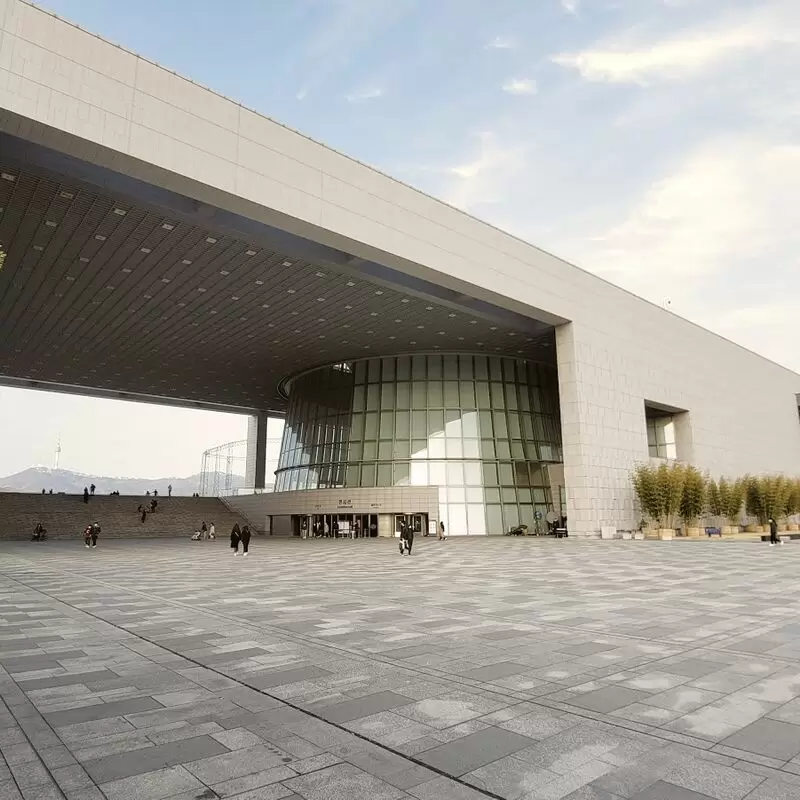 National Museum of Korea
National Museum of Korea
137 Seobinggo-ro, Yongsan-gu
Monday - Sunday: 10:00 AM – 6:00 PM
Wednesday - Saturday: 10:00 AM – 9:00 PM

137 Seobinggo-ro, Yongsan-gu
Wednesday - Saturday: 10:00 AM – 9:00 PM
4. War Memorial of Korea
The War Memorial of Korea is a must-see for history buffs and military enthusiasts. This incredible museum pays tribute to all those who fought and lost their lives in the Korean War and offers a unique insight into the country's turbulent past. Here you can see an extensive collection of artifacts, including weapons, documents, and photographs. What makes this museum special, however, are the interactive exhibits where you can learn the soldiers' stories firsthand. Insider tip: Don't miss the outdoor exhibit where you can see tanks, planes and other military vehicles up close. Nearby is also the National Museum of Korea, which is also worth a visit.
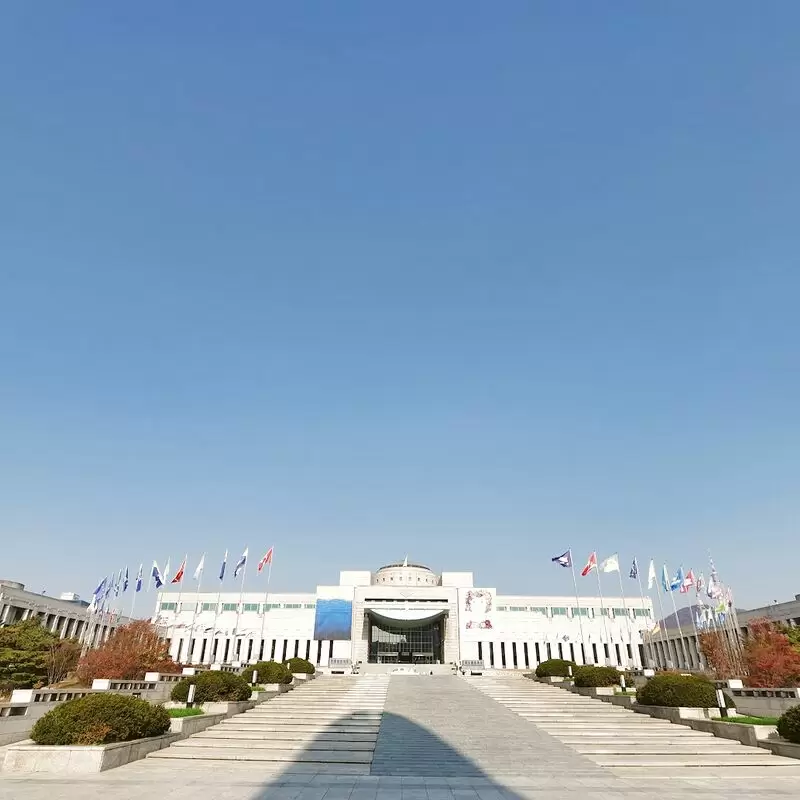 War Memorial of Korea
War Memorial of Korea
29 Itaewon-ro, Yongsan-gu
Monday: Closed
Tuesday - Sunday: 9:30 AM – 6:00 PM

29 Itaewon-ro, Yongsan-gu
Tuesday - Sunday: 9:30 AM – 6:00 PM
5. Changdeokgung
Changdeokgung Palace is a must-see for any visitor to Seoul. This UNESCO World Heritage Site offers a breathtaking insight into Korean history and culture. It is one of the best preserved palaces in South Korea. One of the highlights of this palace is its beautiful garden, which is open to visitors all year round. In addition, the palace offers a "secret garden tour" where you can discover some hidden gems. When you visit Changdeokgung, you should also check out its sister palace Changgyeonggung, which is just a few steps away.
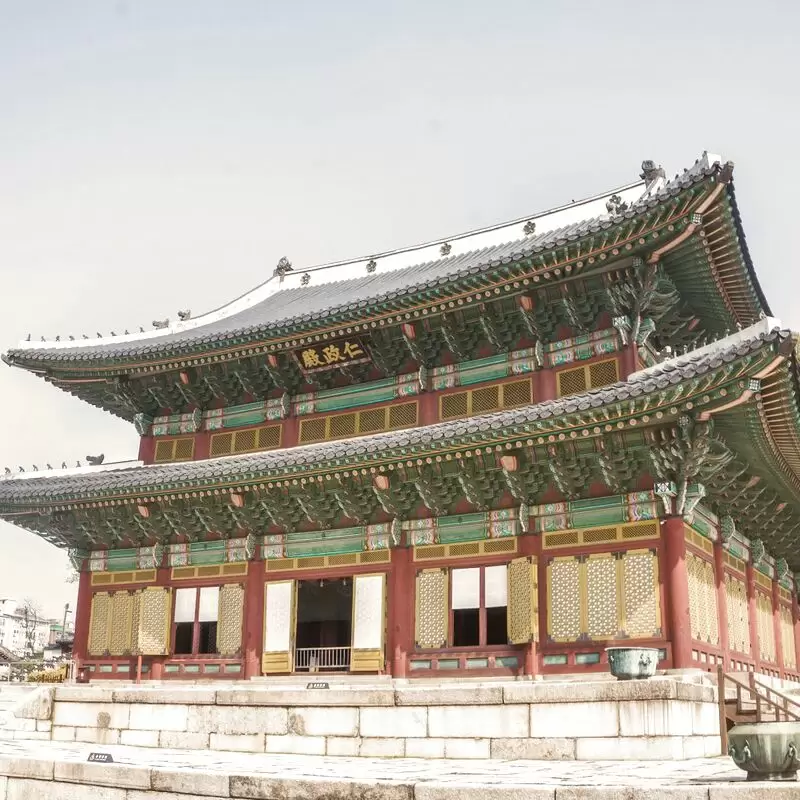 Changdeokgung
Changdeokgung
99 Yulgok-ro, Jongno-gu
Monday: Closed
Tuesday - Sunday: 9:00 AM – 5:00 PM

99 Yulgok-ro, Jongno-gu
Tuesday - Sunday: 9:00 AM – 5:00 PM
6. Bukchon Hanok Village
Located in the heart of Seoul, Bukchon Hanok Village is a must-see cultural destination that offers visitors a glimpse into Korea's ancient past. This well-preserved neighborhood is made up of over 900 traditional Korean houses called hanoks, some of which date back to the Joseon Dynasty. As you stroll through the narrow alleys and streets, you'll feel like you've stepped back in time. Insider tip: Visit in the early morning or late afternoon to avoid the crowds. And while you're in the area, be sure to take a detour to Gyeongbokgung Palace, one of Seoul's most famous landmarks, just minutes away!
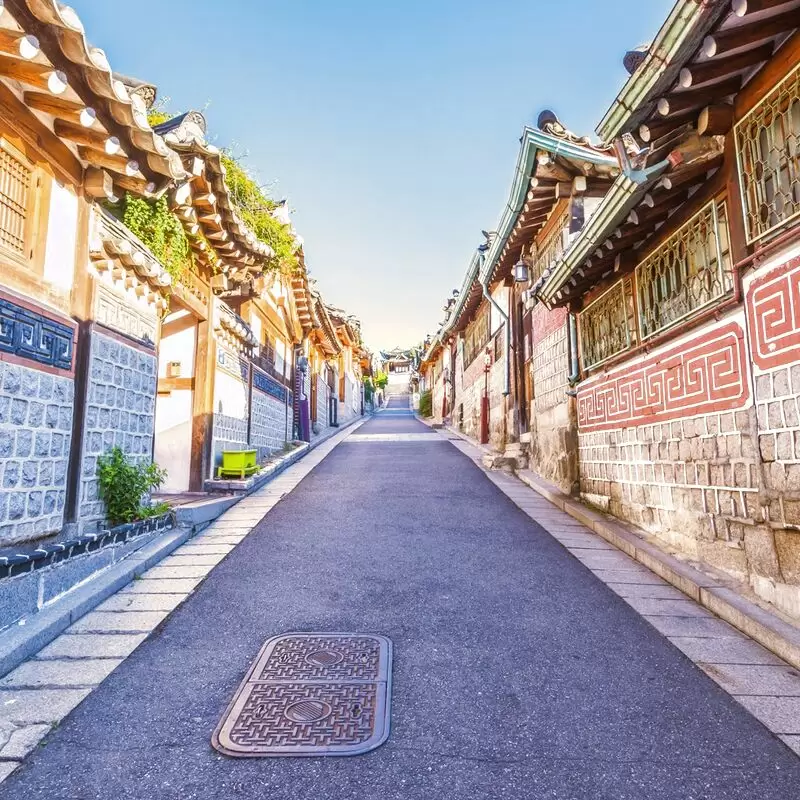 Bukchon Hanok Village
Bukchon Hanok Village
Gyedong-gil, Jongno-gu

Gyedong-gil, Jongno-gu
7. Lotte World
Looking for the ultimate family-friendly destination in Seoul? Then you should definitely visit Lotte World - the largest indoor theme park in the world! Here you will find exciting rides, live performances, parades, and an ice skating rink. But that's not all, Lotte World also offers an outdoor amusement park and a variety of restaurants and shopping. Insider tip: Be sure to attend one of the nightly fireworks shows, which are an unforgettable experience. After visiting Lotte World, be sure to take a detour to nearby Seokchon Lake for a leisurely stroll and beautiful views.
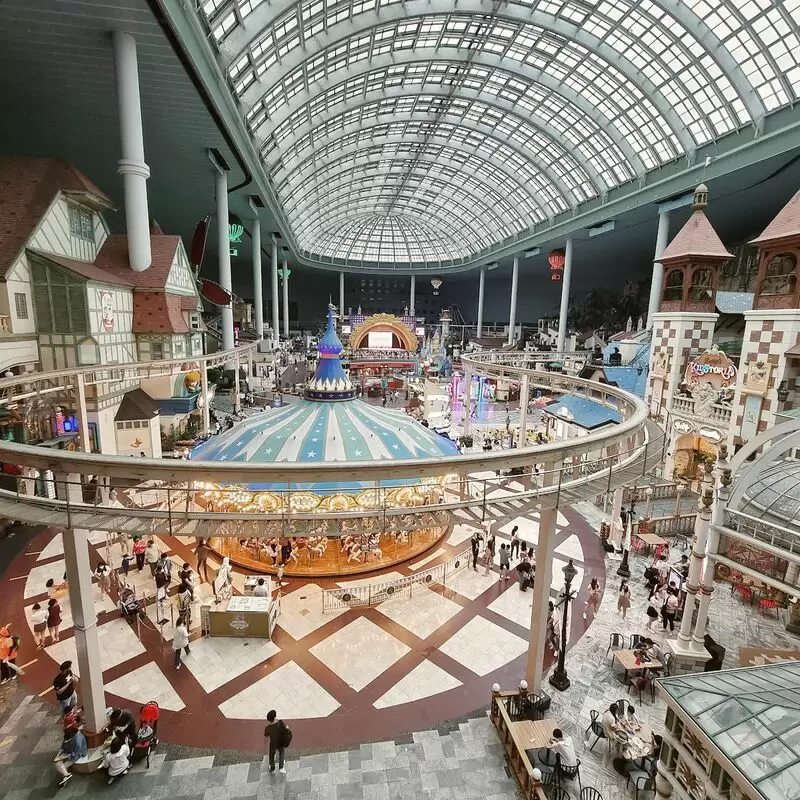 Lotte World
Lotte World
240 Olympic-ro, Songpa-gu
Monday - Thursday: 10:30 AM – 8:00 PM
Friday - Sunday: 10:30 AM – 8:30 PM

240 Olympic-ro, Songpa-gu
Friday - Sunday: 10:30 AM – 8:30 PM
8. Gwangjang Market
Visit Gwangjang Market in Seoul for an unforgettable shopping experience with local flair. This bustling market is a paradise for food lovers who want to try Korean street foods like bindaetteok (mung bean pancakes) and mayak gimbap (addictive rice rolls). In addition to culinary delights, the market offers visitors an authentic atmosphere, traditional hanbok clothing and antique souvenirs. Just a stone's throw away is the picturesque Cheonggyecheon Stream, which invites you to take a leisurely stroll after the market experience.
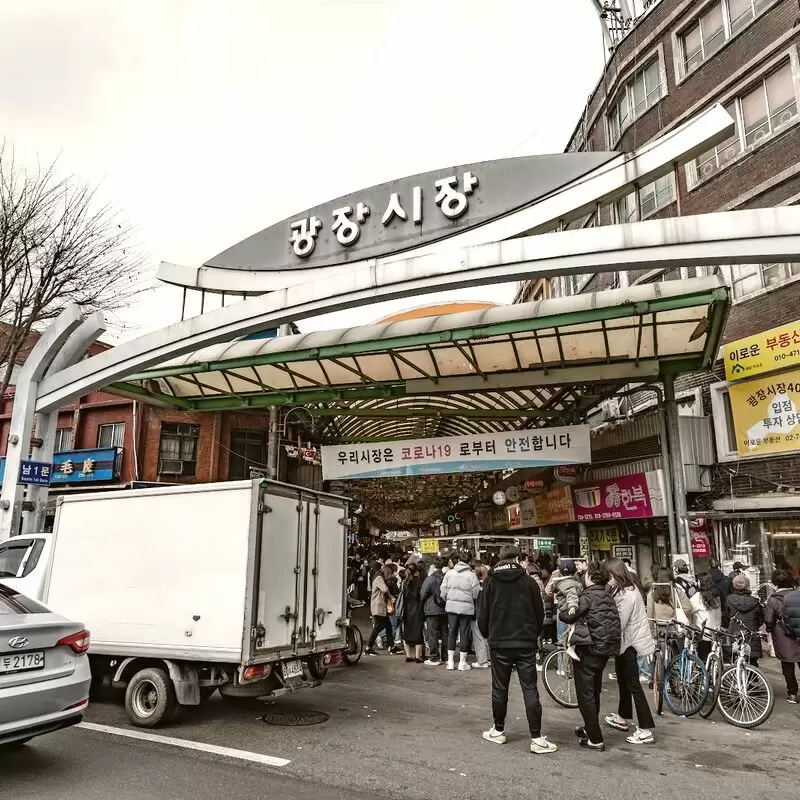 Gwangjang Market
Gwangjang Market
88 Changgyeonggung-ro, Jongno-gu
Monday - Sunday: 9:00 AM – 11:00 PM

88 Changgyeonggung-ro, Jongno-gu
9. Namsangol Hanok Village
Are you ready to turn back time and experience traditional Korean culture? Then you should visit the charming Namsangol Hanok Village in the heart of Seoul. This beautifully preserved village offers visitors the chance to tour reconstructed traditional Korean homes and learn more about ancient customs and traditions. Walk through the pretty gardens, participate in cultural events and workshops, and take photos of the stunning architecture. Insider tip: Visit in the evening, when lanterns light up the entire village. And don't forget to visit the nearby Namsan Tower for stunning panoramic views of the city.
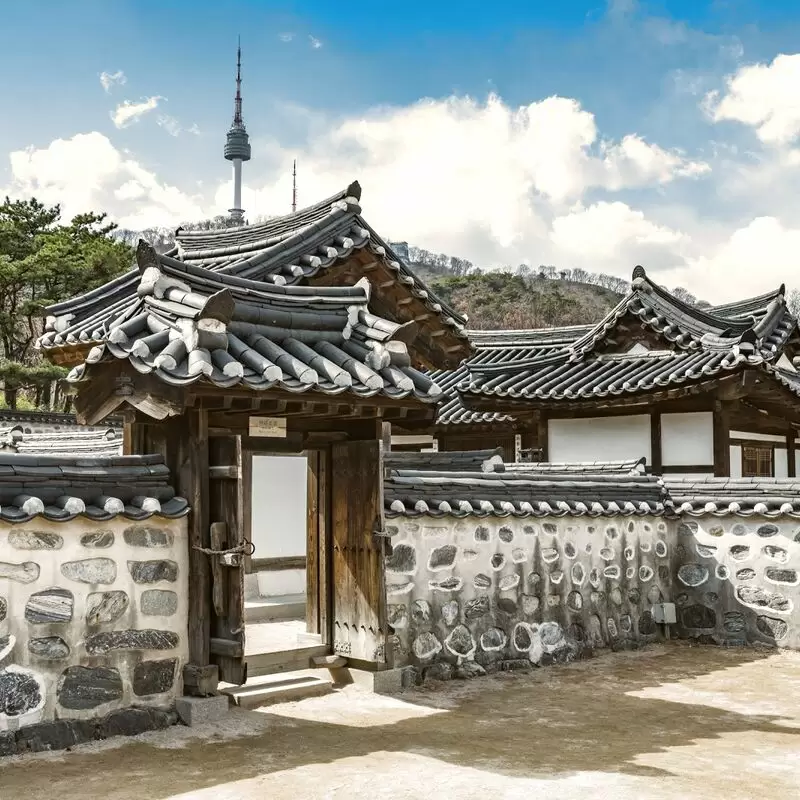 Namsangol Hanok Village
Namsangol Hanok Village
28 Toegye-ro 34-gil, Jung-gu
Monday: Closed
Tuesday - Sunday: 9:00 AM – 8:00 PM

28 Toegye-ro 34-gil, Jung-gu
Tuesday - Sunday: 9:00 AM – 8:00 PM
10. Jogyesa Temple
Jogyesa Temple is a must-see for anyone exploring Seoul! This historic Buddhist temple is a peaceful oasis in the middle of the bustling city and offers a glimpse into Korean culture and religion. One of the best times to visit is during the annual Lotus Lantern Festival, when the temple is illuminated by thousands of colorful lanterns. Insider tip: Be sure to try the temple's famous green tea ice cream, made from tea leaves grown right on the temple grounds! And don't miss nearby attractions like the Insadong shopping district and Gyeongbokgung Palace.
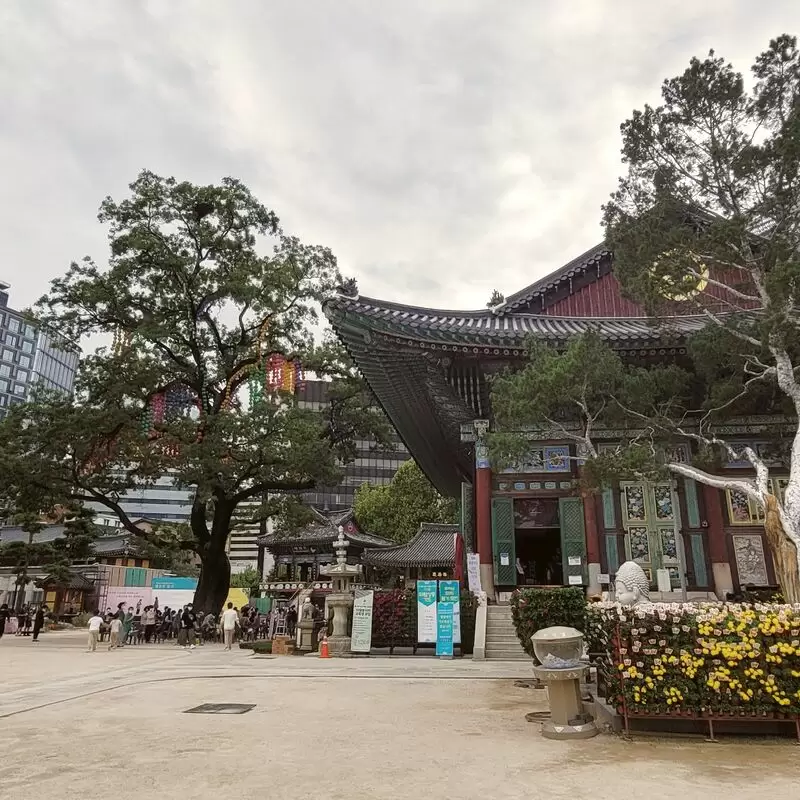 Jogyesa Temple
Jogyesa Temple
55 Ujeongguk-ro, Jongno-gu

55 Ujeongguk-ro, Jongno-gu
11. Cheonggyecheon
The Cheonggyecheon is a must for those who want to escape the hustle and bustle of city life. This 8.4 km long river is a hidden gem in the heart of the city and offers you the opportunity to take a quiet walk or bike ride along its banks. Insider tip: Visit the river at night, when it is illuminated with thousands of lights that create a romantic and enchanting atmosphere. The creek leads to Gwanghwamun Square, where the iconic statue of King Sejong is located. So continue your adventure and explore this nearby attraction.
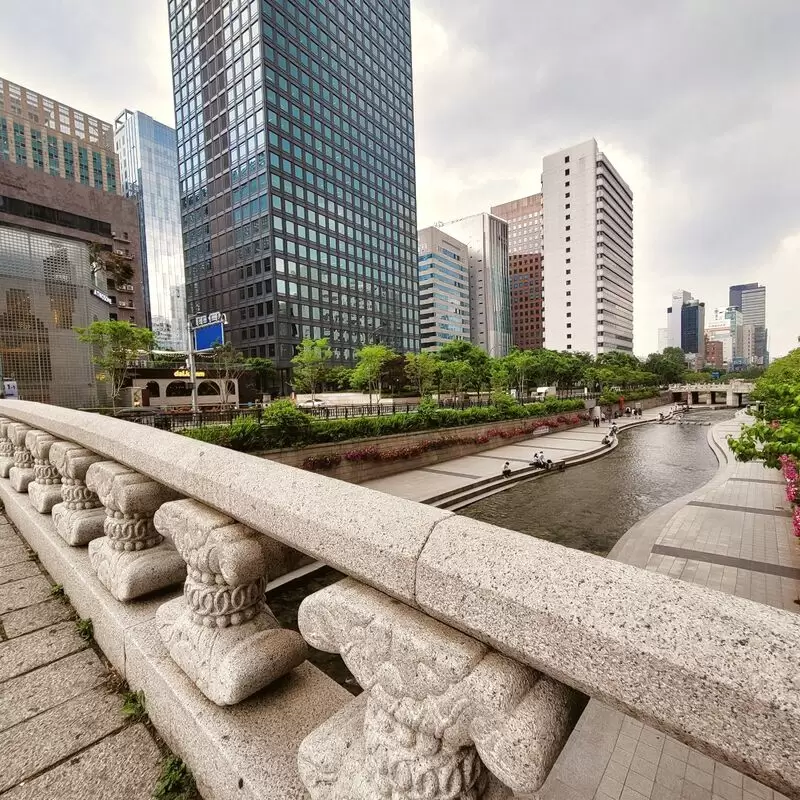 Cheonggyecheon
Cheonggyecheon
Jongno-gu
Monday - Sunday: Open 24 hours

Jongno-gu
12. Bukhansan National Park
Bukhansan National Park is a must-see for nature lovers visiting Seoul. The park offers an incredible backdrop of breathtaking mountain peaks, tranquil streams and lush green forests. It is the perfect choice for those who want to escape the hustle and bustle of the city and get some fresh air. Visitors can hike, climb, or just relax with a picnic on the various trails. Insider tip: Be sure to visit Baegundae Peak, the park's highest peak, which offers breathtaking views of the city. Other nearby attractions include the Goyang International Flower Show and the traditional Bukchon Hanok Village.
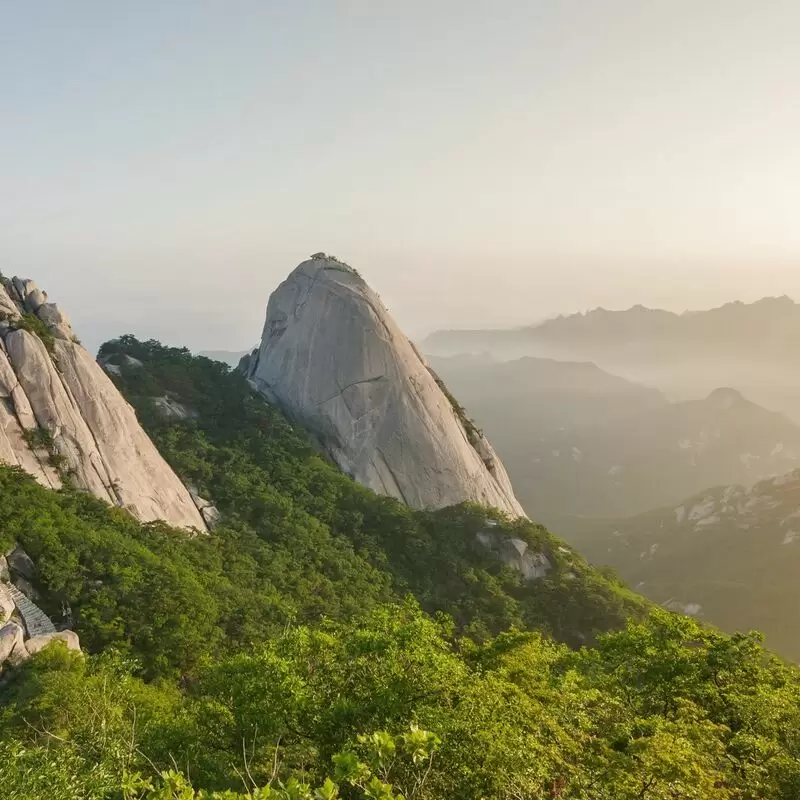 Bukhansan National Park
Bukhansan National Park
262 Bogungmun-ro, Seongbuk-gu
Monday - Sunday: 4:00 AM – 5:00 PM

262 Bogungmun-ro, Seongbuk-gu
13. Incheon Grand Park
If you want to escape the hustle and bustle of the city, Incheon Grand Park is a must-see in Seoul! This sprawling park is not only perfect for a leisurely day of picnicking, but also features an impressive botanical garden and a zoo with lots of furry and cute animals. Enjoy the park's serene lakes and nature trails or take a relaxing boat ride. An insider tip: Be sure to visit the park's enchanting rose garden. And if you have kids, be sure to visit the nearby Fairy Tale Village for a magical experience.
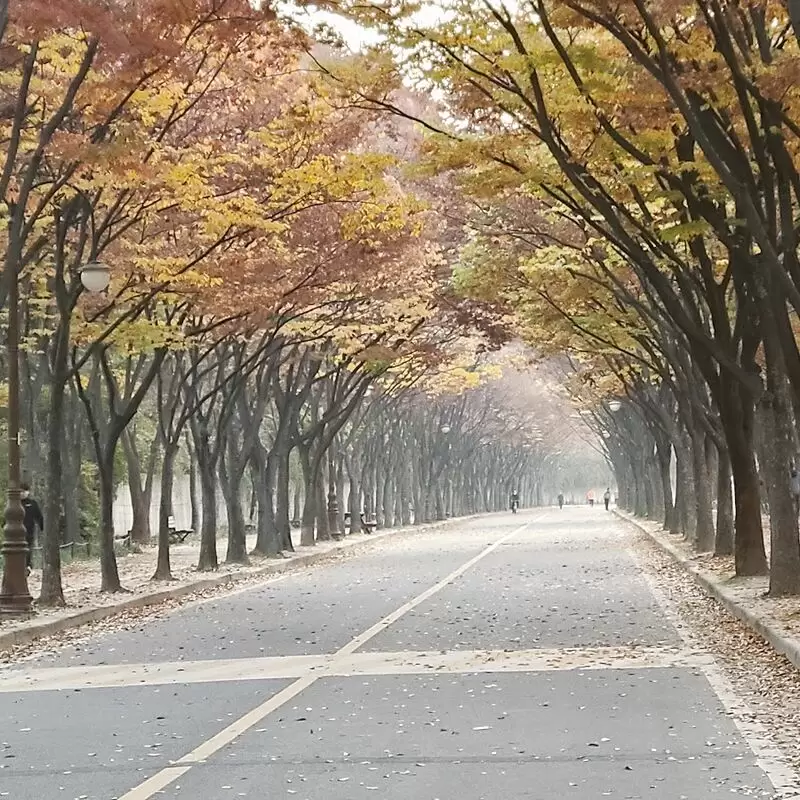 Incheon Grand Park
Incheon Grand Park
236 Munemi-ro, Namdong-gu
Monday - Sunday: 6:00 AM – 10:00 PM

236 Munemi-ro, Namdong-gu
14. Secret Garden Seoul
Are you looking for a quiet retreat from the hustle and bustle of Seoul's busy city center? Explore the "Secret Garden" at Changdeokgung Palace, a UNESCO World Heritage Site. This hidden gem is a photographer's paradise with its breathtaking landscapes. Here you will find sparkling ponds, picturesque pavilions and a 300-year-old tree. With only a limited number of visitors allowed per day, you'll feel like you have this tranquil place all to yourself. Afterwards, you can learn about the traditional Korean way of life at Bukchon Hanok Village, just a short walk away.
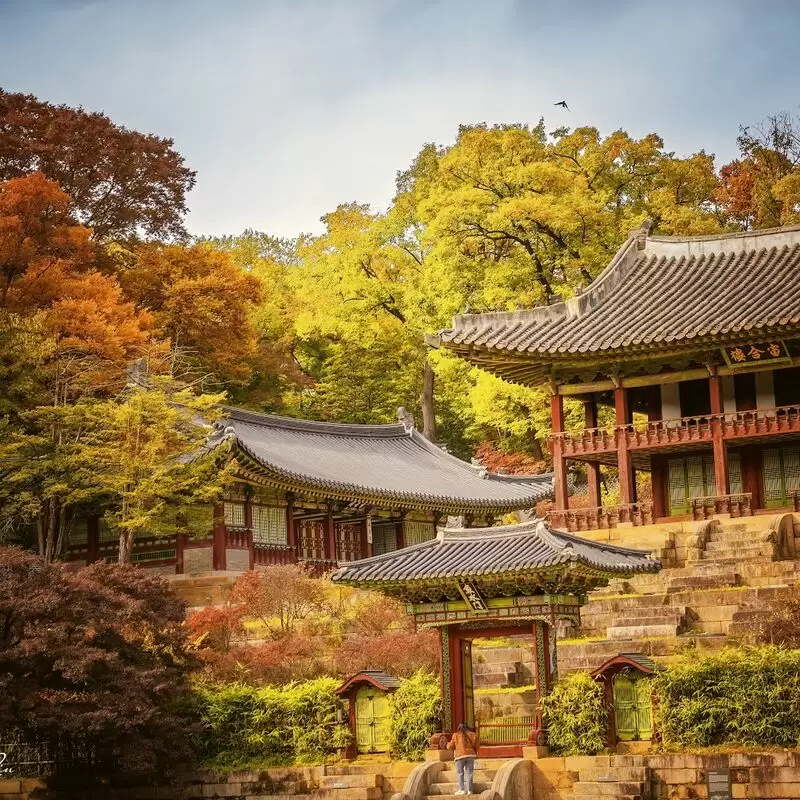 Secret Garden Seoul
Secret Garden Seoul
Monday: Closed
Tuesday - Sunday: 9:00 AM – 5:00 PM

Tuesday - Sunday: 9:00 AM – 5:00 PM
15. Seoullo 7017
If you are looking for a unique and fascinating experience in Seoul, you must visit Seoullo 7017. This iconic pedestrian walkway used to be an overpass for vehicles, but has now been transformed into a beautiful walkway filled with colorful flowers and breathtaking views of the city. As you stroll along the path, you'll discover small vendors selling local snacks and souvenirs, and even a few hidden art installations. Don't forget to take some photos of the stunning skyline from the various observation decks! Nearby, you can also visit Namdaemun Market, which is a center of traditional Korean culture and a haven for delicious street food.
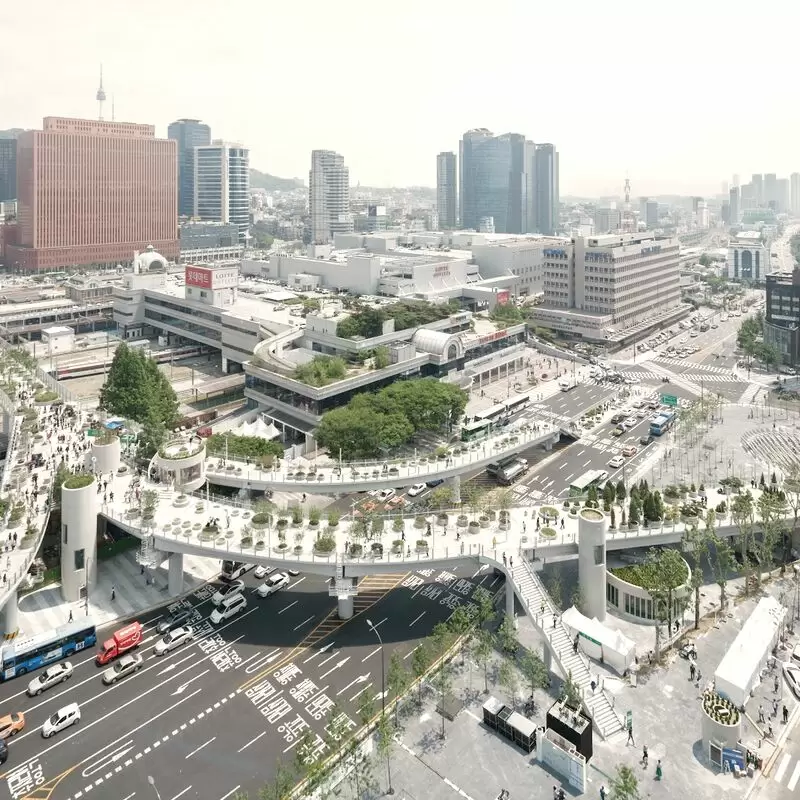 Seoullo 7017
Seoullo 7017
122-14 Bongnae-dong 2(i)-ga, Jung-gu
Monday - Sunday: Open 24 hours

122-14 Bongnae-dong 2(i)-ga, Jung-gu
Best Time to Visit Seoul
The best time to visit Seoul is late spring (April to June) and autumn (September to November). During these seasons, the weather is pleasant with comfortable temperatures, fewer crowds and colorful landscapes. In spring, the cherry trees are in bloom, while in autumn the colorful foliage can be seen. Avoid visiting during the monsoon season (July to August) and winter (December to February), as it rains heavily and temperatures are below zero during this time.
Annual Weather in Seoul
January
Jan
21 / 41 °F
-6 / 5 °C
0
2
79
February
Feb
26 / 44 °F
-3 / 7 °C
0
2
73
March
Mar
36 / 59 °F
2 / 15 °C
1
3
89
April
Apr
45 / 66 °F
7 / 19 °C
1
5
75
May
May
55 / 77 °F
13 / 25 °C
1
5
82
June
Jun
64 / 84 °F
18 / 29 °C
2
5
73
July
Jul
72 / 90 °F
22 / 32 °C
5
12
40
August
Aug
72 / 91 °F
22 / 33 °C
4
11
51
September
Sep
63 / 81 °F
17 / 27 °C
2
5
73
October
Oct
52 / 70 °F
11 / 21 °C
1
3
86
November
Nov
40 / 58 °F
4 / 14 °C
1
4
70
December
Dec
25 / 42 °F
-4 / 5 °C
0
3
75
Questions & Answers
Can I drink tap water in Seoul?
In Seoul, South Korea, tap water is considered safe because it undergoes rigorous purification and regular quality testing. The water is treated under the "Arisu" brand, which promises consumers high-quality, clean water. Although tap water is safe, many locals and tourists prefer to drink bottled water or use filtration systems to increase safety. As a traveler, be sure to consider your sensitivity to different water sources and decide whether to drink tap water or bottled water during your visit.
How safe is Seoul for tourists?
Seoul is generally considered a very safe city for tourists. The crime rate is relatively low and people are known for their helpfulness. Public transportation is well developed and reliable, and most locals understand basic English well. However, caution is always advised, especially in busy areas and late at night. Beware of pickpockets in popular tourist spots, avoid walking alone in dimly lit areas, and keep your personal belongings safe to ensure a safe and enjoyable trip.
How widespread is English in Seoul?
English is fairly widely spoken in Seoul, especially in popular tourist areas, hotels, restaurants and shopping malls, where signs and menus are often available in English. Many younger Koreans have at least a basic knowledge of the language, as English classes are mandatory in schools. However, not everyone is fluent in English, and communication barriers can still occur outside of tourist areas. It's a good idea to learn some basic Korean phrases or carry a translation app with you to help you navigate conversations with locals.
Is it customary to tip in Seoul?
In Seoul, South Korea, tipping is not a common practice and may even be considered unusual. In most situations, such as restaurants, bars or cabs, it is not expected. Service personnel in Seoul are generally paid a reasonable wage without relying on tips. Tour guides and bellboys, however, may be happy to receive a small token of gratitude for their services. Remember that tips are voluntary, and if you feel that you have been provided with exceptional service, you may discreetly tip.
What are some popular Korean dishes to try?
Korean cuisine offers a wealth of delicious and unique dishes. A must-try is kimchi, a spicy, fermented vegetable garnish usually prepared from cabbage or radish. Another popular dish is bulgogi, a thinly sliced, marinated grilled beef often served with rice. Bibimbap, a colorful rice bowl with various vegetables, meat, fried egg and red bell pepper paste, is a tasty and nutritious alternative. Don't forget to try the Korean-style fried chicken, which comes in a variety of flavors.
Is Seoul a walkable city?
Seoul is a relatively pedestrian city with well-maintained sidewalks, pedestrian-friendly streets and an efficient public transportation system. Many major attractions such as palaces, markets and cultural sites are within easy walking distance, allowing visitors to explore and experience the lively atmosphere of Seoul. The city also has several pedestrian malls, walking trails along the Han River, and beautiful parks for hiking. However, due to Seoul's size and hilly terrain, it may be necessary to use public transportation for longer distances.
Are there any strict cultural norms to know?
In Seoul, South Korea, it is important to show respect to elders and authority figures. Koreans bow in greeting and to show their gratitude. When receiving or giving something, use both hands or the right hand while supporting the right elbow with the left hand. When eating, wait until the elders start eating and never pour your own drink. In Seoul, it is customary to take off your shoes before entering a house or other certain places. Finally, it is considered rude to refuse an offered drink or to refuse to partake of a toast.
How expensive is Seoul for travelers?
Seoul is a moderately expensive city for travelers, with costs varying depending on personal preferences and travel style. Accommodation options range from budget hostels to luxury hotels. Dining out can be affordable if you stick to local street food or simple restaurants, but upscale eateries can be expensive. Public transportation is efficient and reasonably priced. Attractions, shopping, and entertainment have a wide price range, so it is important for travelers to budget accordingly to have a comfortable and enjoyable stay in Seoul.
Should I carry cash or use a card?
It is recommended to carry both cash and a card when traveling in Seoul. Many stores accept credit cards, but cash is preferable for small purchases, from street vendors and at traditional markets. South Korea has an extensive network of ATMs where you can easily withdraw cash. International credit cards are widely accepted, but it is advisable to have a card that does not incur foreign transaction fees. A mix of cash and card offers flexibility and makes for a smooth experience when exploring Seoul.
Can I use public transportation easily?
Yes, public transportation in Seoul is very accessible and convenient. The city offers an extensive subway system, buses and cabs that are both affordable and efficient. Subway stations and bus stops are well signposted and provided with maps, often with English translation, so foreigners can easily find their way around. The T-Money card can be used to seamlessly travel on various forms of transportation and can be recharged in stores or at subway stations. Overall, getting around Seoul by public transportation is a breeze for all travelers.
Are there any specific etiquette rules in restaurants?
In South Korean restaurants, it is customary to wait for the oldest or most senior person at the table before the others begin eating. When using chopsticks, do not point or wave them at others and do not put them upright in the rice, as this is reminiscent of a funeral ritual. It is polite to use both hands when receiving or giving anything, including dishes, money or chopsticks. Finally, it is not customary to tip in South Korea; instead, a service charge may be added to the bill.
How to access the Internet or Wi-Fi?
In Seoul, you can access the Internet through various Wi-Fi hotspots or buy a prepaid 4G SIM card. Free public Wi-Fi is widely available at popular tourist spots, subway stations, cafes, restaurants, and shopping malls. Look for networks called "i-Seoul" or "Seoul Wi-Fi" to connect. Alternatively, you can purchase a prepaid 4G SIM card from telecom companies such as KT Olleh, SK Telecom, or LG U+ at Incheon International Airport or in major cities, which will provide high-speed mobile data and phone services throughout your stay.
Is the subway system easy to navigate?
Yes, the subway system in Seoul is relatively easy to use. It is well organized, clean, and efficient, making it a popular mode of transportation for locals and tourists alike. Subway lines are color-coded, and station names are given in both Korean and English. Announcements are also made in multiple languages, and there are visual maps and smartphone apps to help you plan your trip. Although the system may seem overwhelming at first, you'll get the hang of it quickly.
How to rent a bike in Seoul?
Renting a bike in Seoul is easy and convenient, thanks to the city's bike-sharing program called Ttareungi. To rent a bike, download the Ttareungi app on your smartphone, log in, and find a nearby bike station. Scan the QR code on the bike or enter the bike number in the app, and the bike will be unlocked for you. Pay for your ride using the app, which supports several payment options. Be sure to follow local cycling rules and return the bike to a designated Ttareungi station after your ride.
Can I find vegetarian/vegan food options?
Yes, there are numerous vegetarian and vegan dishes in Seoul that cater to a wide range of dietary preferences. While traditional Korean cuisine is known for its meat dishes, more and more restaurants and cafes are offering delicious plant-based dishes. Popular plant-based dishes include veganized Korean dishes such as bibimbap and japchae, as well as international vegan dishes. There are standalone vegan eateries as well as menus at non-vegan restaurants to satisfy your cravings.
What are popular nightlife spots in Seoul?
Seoul has a vibrant nightlife with a variety of options for different preferences and moods. The busy streets in areas like Hongdae, Gangnam and Itaewon attract partygoers looking for lively clubs, bars and pubs. Along the Han River, you'll find fine restaurants, romantic eateries and picturesque views. For the more traditional, visit the lively street markets in Myeongdong, Insadong and Noryangjin, where you can enjoy local cuisine and a bustling atmosphere late into the night.
Can I use taxi-hailing apps in Seoul?
Yes, you can use taxi-hailing apps in Seoul, South Korea. The most popular taxi-hailing apps for foreigners are Kakao T and T Map Taxi. These apps offer services like standard cabs, luxury cabs, and drivers at cheap prices. They have features like real-time tracking, notifications, destination entry, and support multiple payment options. Having either Kakao T or T Map Taxi on your smartphone will make your trip around Seoul more convenient and hassle-free.
Are there any dress-code expectations to be aware of?
Although Seoul is generally an open and modern city, one should dress modestly when visiting religious sites such as temples and shrines. It is recommended that you cover your shoulders and refrain from wearing shorts or skirts. Otherwise, you can dress casually and comfortably in most parts of Seoul similar to other major cities. However, Koreans are generally mindful of their appearance, so it is a good idea to avoid sloppy or overly revealing clothing in order to respect local customs.
How can I attend a K-Pop concert?
To attend a K-pop concert in Seoul, you should first check the dates of your favorite K-pop artists on their official websites or via apps like Korea's official K-pop app "K-Pop Star". Once you find a concert, buy tickets through authorized online retailers like Interpark, Melon Ticket or Yes24. Remember that concerts can sell out quickly, so secure your tickets as soon as possible. On the day of the concert, arrive at the venue early to ensure smooth entry.
Are there any customs or traditions to observe in temples?
When visiting temples in Seoul, it is important to observe local customs and traditions. Always dress modestly, cover your shoulders and knees, and remove your shoes before entering the sacred areas. Speak softly and keep quiet to respect the peaceful atmosphere. Do not take photos of the statues or temple interior without permission. Show reverence when approaching altars and statues by bowing. Do not touch religious objects or artifacts, and avoid pointing your fingers directly at them.
Feedback
I hope you found this article informative and helpful. I'm eager to improve the content and make it even more valuable for you. If you have any feedback or suggestions, I would love to hear from you.
Do you have any tips or hidden gems that you think should be added to the list? Are there any areas that you feel could use more explanation or clarification?
Your input is greatly appreciated and will help us to continue providing high-quality content that meets your needs and interests. Please feel free to share your thoughts.
Can I drink tap water in Seoul?
In Seoul, South Korea, tap water is considered safe because it undergoes rigorous purification and regular quality testing. The water is treated under the "Arisu" brand, which promises consumers high-quality, clean water. Although tap water is safe, many locals and tourists prefer to drink bottled water or use filtration systems to increase safety. As a traveler, be sure to consider your sensitivity to different water sources and decide whether to drink tap water or bottled water during your visit.
How safe is Seoul for tourists?
Seoul is generally considered a very safe city for tourists. The crime rate is relatively low and people are known for their helpfulness. Public transportation is well developed and reliable, and most locals understand basic English well. However, caution is always advised, especially in busy areas and late at night. Beware of pickpockets in popular tourist spots, avoid walking alone in dimly lit areas, and keep your personal belongings safe to ensure a safe and enjoyable trip.
How widespread is English in Seoul?
English is fairly widely spoken in Seoul, especially in popular tourist areas, hotels, restaurants and shopping malls, where signs and menus are often available in English. Many younger Koreans have at least a basic knowledge of the language, as English classes are mandatory in schools. However, not everyone is fluent in English, and communication barriers can still occur outside of tourist areas. It's a good idea to learn some basic Korean phrases or carry a translation app with you to help you navigate conversations with locals.
Is it customary to tip in Seoul?
In Seoul, South Korea, tipping is not a common practice and may even be considered unusual. In most situations, such as restaurants, bars or cabs, it is not expected. Service personnel in Seoul are generally paid a reasonable wage without relying on tips. Tour guides and bellboys, however, may be happy to receive a small token of gratitude for their services. Remember that tips are voluntary, and if you feel that you have been provided with exceptional service, you may discreetly tip.
What are some popular Korean dishes to try?
Korean cuisine offers a wealth of delicious and unique dishes. A must-try is kimchi, a spicy, fermented vegetable garnish usually prepared from cabbage or radish. Another popular dish is bulgogi, a thinly sliced, marinated grilled beef often served with rice. Bibimbap, a colorful rice bowl with various vegetables, meat, fried egg and red bell pepper paste, is a tasty and nutritious alternative. Don't forget to try the Korean-style fried chicken, which comes in a variety of flavors.
Is Seoul a walkable city?
Seoul is a relatively pedestrian city with well-maintained sidewalks, pedestrian-friendly streets and an efficient public transportation system. Many major attractions such as palaces, markets and cultural sites are within easy walking distance, allowing visitors to explore and experience the lively atmosphere of Seoul. The city also has several pedestrian malls, walking trails along the Han River, and beautiful parks for hiking. However, due to Seoul's size and hilly terrain, it may be necessary to use public transportation for longer distances.
Are there any strict cultural norms to know?
In Seoul, South Korea, it is important to show respect to elders and authority figures. Koreans bow in greeting and to show their gratitude. When receiving or giving something, use both hands or the right hand while supporting the right elbow with the left hand. When eating, wait until the elders start eating and never pour your own drink. In Seoul, it is customary to take off your shoes before entering a house or other certain places. Finally, it is considered rude to refuse an offered drink or to refuse to partake of a toast.
How expensive is Seoul for travelers?
Seoul is a moderately expensive city for travelers, with costs varying depending on personal preferences and travel style. Accommodation options range from budget hostels to luxury hotels. Dining out can be affordable if you stick to local street food or simple restaurants, but upscale eateries can be expensive. Public transportation is efficient and reasonably priced. Attractions, shopping, and entertainment have a wide price range, so it is important for travelers to budget accordingly to have a comfortable and enjoyable stay in Seoul.
Should I carry cash or use a card?
It is recommended to carry both cash and a card when traveling in Seoul. Many stores accept credit cards, but cash is preferable for small purchases, from street vendors and at traditional markets. South Korea has an extensive network of ATMs where you can easily withdraw cash. International credit cards are widely accepted, but it is advisable to have a card that does not incur foreign transaction fees. A mix of cash and card offers flexibility and makes for a smooth experience when exploring Seoul.
Can I use public transportation easily?
Yes, public transportation in Seoul is very accessible and convenient. The city offers an extensive subway system, buses and cabs that are both affordable and efficient. Subway stations and bus stops are well signposted and provided with maps, often with English translation, so foreigners can easily find their way around. The T-Money card can be used to seamlessly travel on various forms of transportation and can be recharged in stores or at subway stations. Overall, getting around Seoul by public transportation is a breeze for all travelers.
Are there any specific etiquette rules in restaurants?
In South Korean restaurants, it is customary to wait for the oldest or most senior person at the table before the others begin eating. When using chopsticks, do not point or wave them at others and do not put them upright in the rice, as this is reminiscent of a funeral ritual. It is polite to use both hands when receiving or giving anything, including dishes, money or chopsticks. Finally, it is not customary to tip in South Korea; instead, a service charge may be added to the bill.
How to access the Internet or Wi-Fi?
In Seoul, you can access the Internet through various Wi-Fi hotspots or buy a prepaid 4G SIM card. Free public Wi-Fi is widely available at popular tourist spots, subway stations, cafes, restaurants, and shopping malls. Look for networks called "i-Seoul" or "Seoul Wi-Fi" to connect. Alternatively, you can purchase a prepaid 4G SIM card from telecom companies such as KT Olleh, SK Telecom, or LG U+ at Incheon International Airport or in major cities, which will provide high-speed mobile data and phone services throughout your stay.
Is the subway system easy to navigate?
Yes, the subway system in Seoul is relatively easy to use. It is well organized, clean, and efficient, making it a popular mode of transportation for locals and tourists alike. Subway lines are color-coded, and station names are given in both Korean and English. Announcements are also made in multiple languages, and there are visual maps and smartphone apps to help you plan your trip. Although the system may seem overwhelming at first, you'll get the hang of it quickly.
How to rent a bike in Seoul?
Renting a bike in Seoul is easy and convenient, thanks to the city's bike-sharing program called Ttareungi. To rent a bike, download the Ttareungi app on your smartphone, log in, and find a nearby bike station. Scan the QR code on the bike or enter the bike number in the app, and the bike will be unlocked for you. Pay for your ride using the app, which supports several payment options. Be sure to follow local cycling rules and return the bike to a designated Ttareungi station after your ride.
Can I find vegetarian/vegan food options?
Yes, there are numerous vegetarian and vegan dishes in Seoul that cater to a wide range of dietary preferences. While traditional Korean cuisine is known for its meat dishes, more and more restaurants and cafes are offering delicious plant-based dishes. Popular plant-based dishes include veganized Korean dishes such as bibimbap and japchae, as well as international vegan dishes. There are standalone vegan eateries as well as menus at non-vegan restaurants to satisfy your cravings.
What are popular nightlife spots in Seoul?
Seoul has a vibrant nightlife with a variety of options for different preferences and moods. The busy streets in areas like Hongdae, Gangnam and Itaewon attract partygoers looking for lively clubs, bars and pubs. Along the Han River, you'll find fine restaurants, romantic eateries and picturesque views. For the more traditional, visit the lively street markets in Myeongdong, Insadong and Noryangjin, where you can enjoy local cuisine and a bustling atmosphere late into the night.
Can I use taxi-hailing apps in Seoul?
Yes, you can use taxi-hailing apps in Seoul, South Korea. The most popular taxi-hailing apps for foreigners are Kakao T and T Map Taxi. These apps offer services like standard cabs, luxury cabs, and drivers at cheap prices. They have features like real-time tracking, notifications, destination entry, and support multiple payment options. Having either Kakao T or T Map Taxi on your smartphone will make your trip around Seoul more convenient and hassle-free.
Are there any dress-code expectations to be aware of?
Although Seoul is generally an open and modern city, one should dress modestly when visiting religious sites such as temples and shrines. It is recommended that you cover your shoulders and refrain from wearing shorts or skirts. Otherwise, you can dress casually and comfortably in most parts of Seoul similar to other major cities. However, Koreans are generally mindful of their appearance, so it is a good idea to avoid sloppy or overly revealing clothing in order to respect local customs.
How can I attend a K-Pop concert?
To attend a K-pop concert in Seoul, you should first check the dates of your favorite K-pop artists on their official websites or via apps like Korea's official K-pop app "K-Pop Star". Once you find a concert, buy tickets through authorized online retailers like Interpark, Melon Ticket or Yes24. Remember that concerts can sell out quickly, so secure your tickets as soon as possible. On the day of the concert, arrive at the venue early to ensure smooth entry.
Are there any customs or traditions to observe in temples?
When visiting temples in Seoul, it is important to observe local customs and traditions. Always dress modestly, cover your shoulders and knees, and remove your shoes before entering the sacred areas. Speak softly and keep quiet to respect the peaceful atmosphere. Do not take photos of the statues or temple interior without permission. Show reverence when approaching altars and statues by bowing. Do not touch religious objects or artifacts, and avoid pointing your fingers directly at them.
Feedback
I hope you found this article informative and helpful. I'm eager to improve the content and make it even more valuable for you. If you have any feedback or suggestions, I would love to hear from you.
Do you have any tips or hidden gems that you think should be added to the list? Are there any areas that you feel could use more explanation or clarification?
Your input is greatly appreciated and will help us to continue providing high-quality content that meets your needs and interests. Please feel free to share your thoughts.
I hope you found this article informative and helpful. I'm eager to improve the content and make it even more valuable for you. If you have any feedback or suggestions, I would love to hear from you.
Do you have any tips or hidden gems that you think should be added to the list? Are there any areas that you feel could use more explanation or clarification?
Your input is greatly appreciated and will help us to continue providing high-quality content that meets your needs and interests. Please feel free to share your thoughts.
